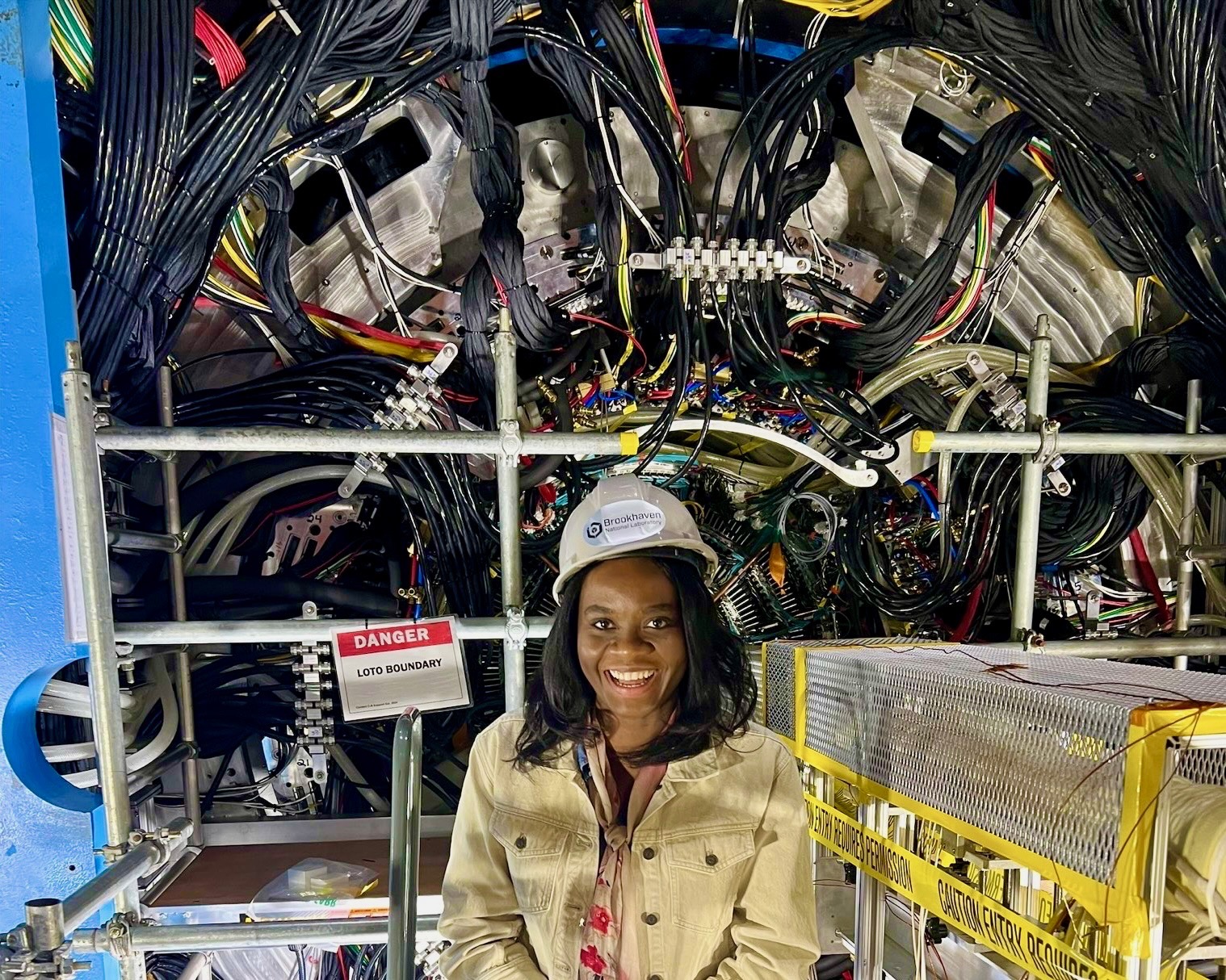 How long have you been working in sPHENIX and at what institution?
How long have you been working in sPHENIX and at what institution?
I have been working in sPHENIX since the summer of 2020 right after completing my Ph.D. I was initially John Lajoie’s PostDoc, who was at the time affiliated with Iowa State University. I spent half of that PostDoc position stationed at Brookhaven National Laboratory (BNL), where I subsequently joined the sPHENIX group at BNL in the summer of 2022 for a second PostDoc position under the supervision of Dave Morrison.
What is the focus of your work on the sPHENIX experiment?
I started out working on the hadronic calorimeters (HCAL)— I installed some of the HCAL scintillating tiles into sectors at BNL and determined the initial HCAL calibration constants using cosmic muon simulations. I added a map of the tiles’ response (MEPHI Maps) to the HCAL GEANT4 simulation to account for the non-uniformity of the tiles. At this time, I was half in sPHENIX and half in ATLAS— I worked on jet underlying event studies in sPHENIX and the determination of the jet energy resolution in ATLAS 2018 low mu 13 TeV pp data as part of a qualification task. After completing that task, I worked on the sPHENIX Event Plane Detector (sEPD), where I wrote a large fraction of the simulation software; as well as overseeing the mapping from simulation to data-ready containers. I served as the offline software coordinator for the sEPD. Shortly after, I worked on the sPHENIX Event Display used by all sPHENIX subsystems during run 2023. I worked on commissioning the Zero Degree Calorimeter (ZDC) during run 2023 and more recently became one of the ZDC experts. Concurrently, I worked on the sPHENIX Event Plane Determination Package, which uses several sPHENIX forward detectors to determine the event plane. I am interested in studying collectivity (with jets and hadrons), and in small systems and UPCs.
Where were you born and what is your educational background before your
current position?
I was born in Nigeria. I went to high school in Sugar Land, Texas. I attended the University of Houston (UH) for a Bachelor of Science in Biology and Physics, then a Masters in Physics. Initially, I planned to apply for the Medical Physics Residency at MD Anderson, but completed a Ph.D in high energy nuclear physics at UH instead.
What is the title of your Ph.D. or tentative title? Awards or
biggest talk highlight?
My Ph.D thesis title is event-by-event net-lambda fluctuations in Pb-Pb collisions at 5.02 TeV with the ALICE detector at the LHC. The research pertained to checking for flavor dependence of the QCD crossover temperature. To date, what I consider my biggest talk is the first seminar talk I gave at LBNL when I was a graduate student. Barbara Jacak had sent me an invitation to discuss my thesis work in the presence of STAR’s fluctuation measurement experts at the most inopportune time— I had just suffered a nasty knee injury in Geneva, Switzerland. Weeks later, I flew to Berkeley with crutches and broke the ice by telling the audience that I had fooled my Houston friends by saying I had inadvertently created a blackhole while I was working on a detector part and it had spaghettified my knee. I proceeded with my presentation and got a standing ovation from the audience with Nu Xu, Volker Koch, Xin-Nian, Peter Jacobs; among others in the room. In Barbara’s words, I answered all the questions correctly. For awards, I received the the UH’s Provost Undergraduate Research Scholarship and Graduate Tuition Fellowship.
How did you decide to go into heavy ion or spin research?
I ended up doing heavy ion research because I took particle physics as an elective. As a result, I ran into Rene Bellwied and he recommended that I join his group with the promise of travel and access to a big collaboration. True to his word, I was in Geneva shortly after joining his group doing a shift at P2. I have been enthralled with the field ever since.
What do you like to do in your spare time?
Having lived in several places and away from loved ones I like to use my free time to catch up (including quick weekend flights to Houston). I enjoy watching mystery and crime shows, e.g. works inspired by Agatha Christie’s novels. I also enjoy following the evolution of Afrobeats and the African pidgin language— though originating from West Africa, they have since broken many contextual, cultural and geographical boundaries.
Fun fact?
In my childhood I was very obsessed with poetry and composing lyrics. I thought I’d grow up to be a writer or singer.